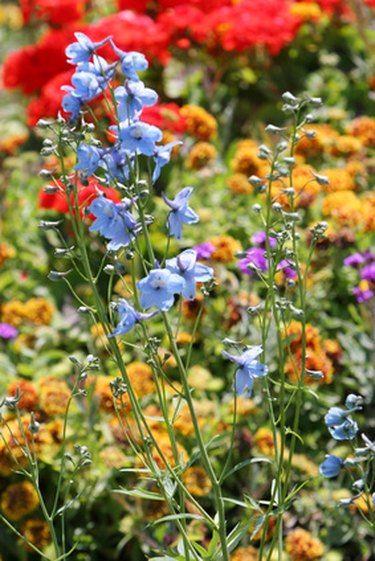Things You'll Need
Lawnmower
Herbicide
Eye protection
Rubber gloves

Florida betony (Stachys floridana), is an invasive weed that grows to a height of about 2 feet. It is nicknamed the rattlesnake weed because its underground stems grow in fleshy, tuberous segments that look like rattlesnake rattles. Once this weed is established, it is very difficult to eradicate. If not controlled, it will choke out everything else, including flowers, lawns and other landscape and gardening plants. You can control it, but you must exercise caution or your efforts to eradicate this weed will kill the plants you are trying to protect.
Step 1
Mow your lawn every one to two weeks. Keeping the lawn short will helps to prevent rattlesnake weeds from gaining a foothold in your grass.
Video of the Day
Step 2
Fertilize your lawn and add lime to keep the grass healthy and thick. A thick, vigorously growing lawn, combined with regular mowing, is your best defense against rattlesnake weed getting started in your yard.
Step 3
Dig out any rattlesnake weeds that are present in areas other than your lawn. You must be sure to dig down far enough to find and remove the tubers, or the weed will quickly pop up again.
Step 4
Apply a broadleaf herbicide to Florida betony that is growing outside of lawn areas. One that contains glyphosate is best. Be careful to shield other plants from the herbicide, as it will kill anything that it touches.
Step 5
Repeat the herbicide application in the spring and fall for two years. This is necessary because rattlesnake weed has an extensive network of roots and tubers and repeated application is the only way to be sure that you completely eradicate it.
Tip
If rattlesnake weed is infesting your flower beds and you don’t want to spray, you can use liquid in a bucket and apply herbicide directly to the leaves by using a sponge. Be sure to wear rubber gloves if you try this method. If you spray herbicide, do it on a calm day so the wind won’t blow it onto other plants.
Warning
Use caution when applying herbicide. Gloves and eye protection are recommended. Follow all manufacturer’s instructions when applying. Herbicides can harm people, pets, wildlife and other plants. Be sure to properly dispose of all equipment when you are finished with the application.
Video of the Day